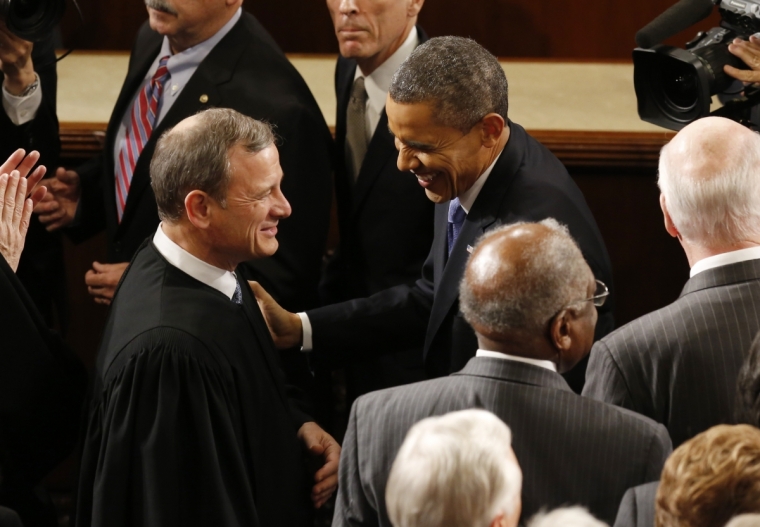SCOTUS upholds Obamacare subsidies

WASHINGTON, D.C. (Christian Examiner) – The Supreme Court today upheld a key provision of the Affordable Care Act in a 6-3 decision, ruling low- and middle-income Americans are entitled to tax subsidies that help them afford health insurance (under Section 36B of the law).
Chief Justice John Roberts wrote the opinion for the high court in its decision in King v. Burwell, a case which challenged federal subsidies flowing through a federal insurance exchange when the language of the laws says insurance exchanges, or marketplaces, will be "established by the state."
Justices Anthony Kennedy, Ruth Bader Ginsburg, Stephen Breyer, Sonia Sotomayor and Elena Kagan joined Roberts in his ruling.
Opponents of the law believed its language on state exchanges versus the unlawful construction of the federal exchange should have been its Achilles Heel, causing the entire structure of Obamacare to collapse. They argued during the case that the law should be interpreted according to its actual words – its literal meaning.
You would think the answer would be obvious—so obvious there would hardly be a need for the Supreme Court to hear about it. ... But normal rules of interpretation seem always to yield to the overriding principle of the present Court: The Affordable Care Act must be saved.
Roberts said the petitioners' "plain-meaning arguments are strong," but added "the Act's context and structure compel the conclusion that Section 36B allows tax credits for insurance purchased on any Exchange created under the Act. Those credits are necessary for the Federal Exchanges to function like their State Exchange counterparts, and to avoid the type of calamitous result that Congress plainly meant to avoid."
Roberts acknowledged the law was not written clearly, but said in spite of its "ambiguous" nature, the "combination of no tax credits and an ineffective coverage requirement could well push a State's individual insurance market into a death spiral."
Roberts also wrote:
"In a democracy, the power to make the law rests with those chosen by the people. Our role is more confined—'to say what the law is.' ... That is easier in some cases than in others. But in every case we must respect the role of the Legislature, and take care not to undo what it has done. A fair reading of legislation demands a fair understanding of the legislative plan."
"Congress passed the Affordable Care Act to improve health insurance markets, not to destroy them. If at all possible, we must interpret the Act in a way that is consistent with the former, and avoids the latter. Section 36B can fairly be read consistent with what we see as Congress's plan, and that is the reading we adopt."
Justice Antonin Scalia wrote a scathing dissent of Roberts' ruling in the case. He was joined – as expected – by Justices Samuel Alito and Clarence Thomas. Scalia said the answer to the case should have been easily determined by the Court.
"You would think the answer would be obvious—so obvious there would hardly be a need for the Supreme Court to hear about it," Scalia wrote.
"Words no longer have meaning if an Exchange that is not established by a State is 'established by the State.' It is hard to come up with a clearer way to limit tax credits to state Exchanges than to use the words 'established by the State.' And it is hard to come up with a reason to include the words 'by the State' other than the purpose of limiting credits to state Exchanges. '[T]he plain, obvious, and rational meaning of a statute is always to be preferred to any curious, narrow, hidden sense that nothing but the exigency of a hard case and the ingenuity and study of an acute and powerful intellect would discover,'" Scalia wrote, citing Lynch v. Alworth-Stephens Co. (1925) as precedent for the literal interpretation of laws.
"But normal rules of interpretation seem always to yield to the overriding principle of the present Court: The Affordable Care Act must be saved."
This is not the first time Roberts, appointed by President George W. Bush, has departed from the "originalism" he pledged during his confirmation hearings in 2005.
Roberts also wrote the court's opinion in the first challenge to the ACA in 2012, which argued against the law's "individual mandate" to purchase health insurance. Roberts claimed that law survived as a "tax," in spite of the Obama administration's repeated claim the law was not a tax.
RELATED ARTICLES:
Dissenting Justices: court's decision imperils democracy, religious liberty
Franklin Graham: Christian should prepare for persecution
2015 Presidential candidates react to Supreme court ruling on same-sex marriage
White House: 'Love Wins'' President Obama calls SCOTUS gay marriage ruling 'gratifying'
SCOTUS approves same-sex marriage
Chuck Colson, from the grave: Gay marriage legalaization to bring 'wrath of God' on America